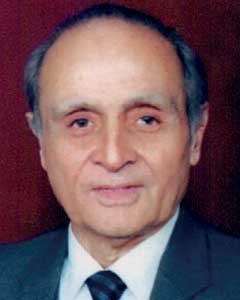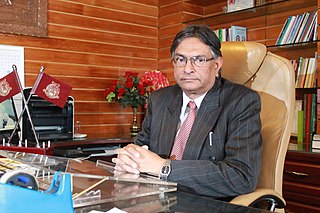
Jamia Millia Islamia is a public and research university located in Delhi, India. Originally established at Aligarh, United Provinces during the British Raj in 1920, it moved to its current location in Okhla in 1935. It was given the deemed status by the University Grants Commission in 1962. Jamia Millia Islamia became a central university by an act of the Indian parliament which was passed on 26 December 1988.

Saifuddin Kitchlew was an Indian independence activist, barrister, politician and later a leader of the peace movement. A member of Indian National Congress, he first became Punjab Provincial Congress Committee head and later the General Secretary of the All India Congress Committee in 1924. He is most remembered for the protests in Punjab after the implementation of Rowlatt Act in March 1919, after which on 10 April, he and another leader Satyapal, were secretly sent to Dharamsala. A public protest rally against their arrest and that of Gandhi, on 13 April 1919 at Jallianwala Bagh, Amritsar, led to the infamous Jallianwala Bagh massacre. He was also a founding member of Jamia Millia Islamia. He was awarded the Stalin Peace Prize in 1952.

Mohammad Ajmal Khan, better known as Hakim Ajmal Khan, was a physician in Delhi, India, and one of the founders of the Jamia Millia Islamia university in Delhi, India. He also founded another institution, Ayurvedic and Unani Tibbia College, better known as Tibbia College, situated in Karol Bagh, Delhi. He was the only Muslim to chair a session of the Hindu Mahasabha. He became the Jamia Millia Islamia's first chancellor in 1920 and remained in office until his death in 1927.

Sayed Zahoor Qasim was an Indian marine biologist. Qasim helped lead India's exploration to Antarctica and guided the other seven expeditions from 1981 to 1988. He was a Member of the Planning Commission of India from 1991 to 1996. He was the Vice Chancellor of Jamia Milia Islamia from 1989 to 1991 and an Honorary Professor of universities including Aligarh Muslim University, Madurai Kamaraj University, Anna Malai University, Indian Institute of Technology Madras, and Jamia Millia Islamia. He was awarded the highest civilian awards Padma Shri and Padma Bhushan by the Government of India.
Mushirul Hasan was a historian of modern India. He wrote on the partition of India, communalism, and on the history of Islam in South Asia.

Al Jamiatul Ashrafia is a Sunni Madrasa in India. It is located in Mubarakpur in a Northern State of India, Uttar Pradesh.
A.J.K. Mass Communication Research Centre is a mass communication research centre located in New Delhi, India and a constituent institute of the Jamia Millia Islamia. The full form for AJK MCRC is Anwar Jamal Kidwai Mass Communication Research Centre named after its founder Anwar Jamal Kidwai in 1982.

Talat Ahmad is an Indian Earth Scientist, former Professor at the Department of Geology, University of Delhi and served as Indian National Science Academy (INSA) Senior Scientist. He served as Chairman of Governing body which oversees Wadia Institute of Himalayan Geology, Dehradun from 1 November 2021 onwards and served the office till 31 October 2027. Previously, he commenced his second stint as Vice-Chancellor of University of Kashmir on 6 August 2018 and served the office till 20 May 2022. Before that, he served as Vice Chancellor of Jamia Millia Islamia, he resigned from the post a few months short of his full term. He was shortlisted by a committee constituted by the governor to shortlist a panel for the post. He had earlier taken over as Vice-Chancellor of University of Kashmir from Professor Riyaz Punjabi on 1 June 2011 and served there until the year 2014. Prior to this, he was teaching Geology at the University of Delhi.
Akhtarul Wasey is an Indian scholar and academician, who serves as the president of Maulana Azad University, in Jodhpur, India. He formerly served as professor of Islamic Studies at Jamia Millia Islamia in New Delhi, where he remains professor emeritus in the Department of Islamic Studies.
Furqan Qamar is a former vice-chancellor of University of Rajasthan and first vice-chancellor of Central University of Himachal Pradesh. Earlier he was associated with Association of Indian Universities. Professor Furqan Qamar, was the Secretary General of the Association of Indian Universities, i.e. the principal executive officer of the largest and one of the oldest network of universities. He has also served as Advisor (Education) in the Planning Commission of India.
Mohammad Mujeeb (1902–1985) was an Indian writer of English and Urdu literature, educationist, scholar and the vice chancellor of Jamia Millia Islamia, Delhi.

Mohammad Sami, FASc and FNASc is an Indian theoretical physicist and cosmologist, known for his work on dark energy. In 2011, his research paper titled, "Dynamics of Dark Energy", co-authored with Edmund J Copeland and Shinji Tsujikawa, was included in the Nobel Prize Committee Document.
Zafar Ahmad Nizami was an Indian author, poet and writer. He served the Jamia Millia Islamia as Professor of Political Science for about 30 years and authored books like Memarān-e-Jamia, Hindustān ke chand Siyasi Rahnuma, Maulana Azad Ki Kahani and Tarīkh-e-Hind: Ahd-e-Jadeed.

Muhammad Salim Qasmi Siddiqi was an Indian Muslim scholar who co-founded the Darul Uloom Waqf in Deoband and served as its first rector. He was an alumnus of Darul Uloom Deoband. He received the fourth Shah Waliullah Award and was honoured with the Mark of Distinction from Egypt.

Nuzhat Parveen Khan is an Indian academic and author who served as the dean of Bennett University's School of Law. She has formerly served as the dean of Jamia Millia Islamia's Faculty of Law and is now a professor at the university. She has authored dozen of books including Women and Child related Laws, Comparative Constitutional Law and Globalisation of Professional Legal Education Constitutional Conspectus.

Abdul Lateef Azmi was an Urdu litterateur and among the close associates of the founders of Jamia Millia Islamia. He joined Jamia Millia as a student of B.A. in 1936 and served the university over 50 years in various capacities. He was one of the longest serving editors of Jamia Millia's official magazine, Jamia. He died in Delhi on May 11, 2002. In 1985, Maktaba Jamia, New Delhi, published a book Abdul Lateef Azmi Hayat-o-Khidmat. Several scholars contributed chapters in the book on various facets of Abdul Lateef Azmi and his life.














